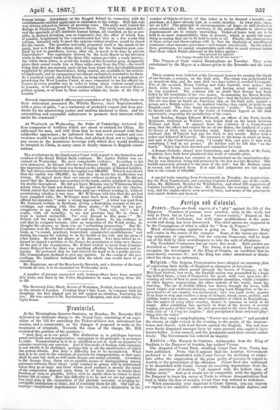At the Birmingham Quarter-Sessions, on Monday, Mr. Recorder Hill delivered
an elaborate charge to the Grand Jury, consisting of an exposition of the bill for amending the Ticket-of-leave Act, introduced last session, and a commentary on the changes it proposed to make in the treatment of criminals. Towards the close of the charge, Mr. Hill reviewed the position of his question " And, first, as to our gains. The distinction as to privileges between penal servitude and transportation—repugnant to all principle—is no longer to exist. Transportation is to be so modified as not to work an injustice to colonies receiving our convicts. And if that mode of dealing with criminals is not wholly to be abolished, perhaps this is all the amelioration of which the system admits. But here a difficulty has to be encountered. What test is to be used in the selection of convicts for transportation, so that none shall be sent but such as will make decent and useful colonists. According to Sir George Grey, there are no possible means of distinguishing among prisoners between those whose 'good conduct in prison will be maintained when they go at large and those whose good conduct is merely the result of the compulsion imposed upon them, or of their desire to obtain their freedom as soon as possible, with a view to enable them to return to their former life of crime: How this difficulty is to be met we are not apprized. Our next gain is the recognition of the absolute necessity of keeping incorrigible malefactors at home, and of confining them for life. Guided advantage—lengthened imprisonment for convicts, and a diminution in the
number of tickets-of-leave (if this latter is to be deemed a benefit)—we purchase, as I have already said, at a costly sacrifice. In what state, then, are we left ? The principle of encouragement—of hope—is still limited to great criminals ; while the exertions of the minor offender to shorten his imprisonment are to remain unavailing. Ticket-of-leave men are to be held to no more responsibility than at present; which i nearly the same thing as saying they are to be held to none at all. Finally, the consequence of these errors and shortcomings will be that the discharge of unreformed criminals—that monster grievance—will remain unredressed. On the whole them gentlemen, we cannot congratulate each other in much warmer terms than those which Belial addresses to the fallen spirits—
Our present lot appears For happy though but ill, for ill not worst.' "
The Princes of Oude visited Birmingham on Tuesday. They were entertained by the Mayor at a dinner given to the Recorder and the local bar.
Three seamen were indicted at the Liverpool Assizes for causing the death of one George, a seaman, on the high seas. The crime was perpetrated in an American ship, and the man died two days before it reached Liverpool. Two of the accused, Henry Calling and John Caswell, wore mates ; the third, John Lewis, was boatswain ; and having acted under orders, he was acquitted. The evidence left no doubt that George had been killed by the brutalities of the two mates. In summing up, Baron Martin said the case involved a serious question of law—had the Court jurisdiction ? The act was done on board an American ship on the high seas, against a person not a British subject : he doubted whether they could be tried in an English court. The Jury found the prisoners "guilty." The Judge said he should take the opinion of the Court of Criminal Appeal on the first opportunity respecting the jurisdiction of the court.
Last Sunday, Ensign Edward M'Carroll, an officer of the Forty-fourth Regiment, stationed at Weimer, was found dead on the beach 'between Widmer and Deal. It appears from the evidence of a Coast-0 uard man, that the officer had roused the ire of one Baker the landlord of a publie-house at Deal, late on Saturday night. Baker s wife falsely told her husband that M'Carroll had put his stick in her mouth. Baker took a poker and followed M'Carroll. Ho returned to his house in about an hour, and said to the Coast-Guard man, "I caught him, and gave it him with something I had in my pocket." He further said he left him "on the beach." Baker has been arrested and committed for trial.
A Roman Catholic chapel near Canterbury, and the church of St. Paul, Deptford, have both been plundered this week of valuable plate.
Mr. George Hudson was arrested at Sunderland on the nomination-day. But he was liberated, being still protected by the law as a late Member. The bailiffs anxiously attended to the state of the poll ; but Mr. Hudson came in second, and defeated them. It is said that judgments are out against him to the extent of 100,000/.
A special train running from Coekermouth on Tuesday, the nominationday for West Cumberland, and carrying Captain Lowther, one of the candidates, Mr. Hildyard, Member for Whitehaven, and about 250 supporters of Captain Lowther, got off the line : Mr. Mayson, the secretary of the railway, and the engine-driver were severely hurt, and many of the passengers were much shaken and bruised.


































 Previous page
Previous page